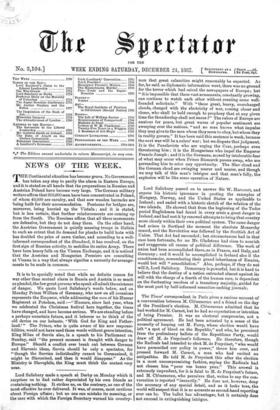Lord Salisbury passed on to answer Sir W. Harcourt, and
expose his historic ignorance in quoting the examples of Hungary, Norway, and the United States as applicable to Ireland; and ended with a historic sketch of the relation of the two islands. He showed that from the beginning of the Tudor period Englishmen had found in every crisis a great danger in Ireland, and had met it by renewed attempts to bring that country more closely within their own political system. The same danger had arisen in Scotland the moment the absolute Monarchy ceased, and the Revolution was followed by the Scottish Act of Union. That Act had succeeded ; but circumstances had in that case been fortunate, for no Mr. Gladstone had risen to nourish and exaggerate all causes of political difference. The work of union had been accomplished there, as in France, and Italy, and Germany ; and it would be accomplished in Ireland also if the constituencies, remembering their grand inheritance of Empire, would but will " consolidation." Also, perhaps, if they do not will it, Lord Salisbury. Democracy is powerful, but it is hard to believe that the destiny of a nation entrusted almost against its will with the charge of a fourth of the human race, is dependent on the fluctuating resolves of a transitory majority, guided for the most part by half-informed sensation-seeking journals.










































